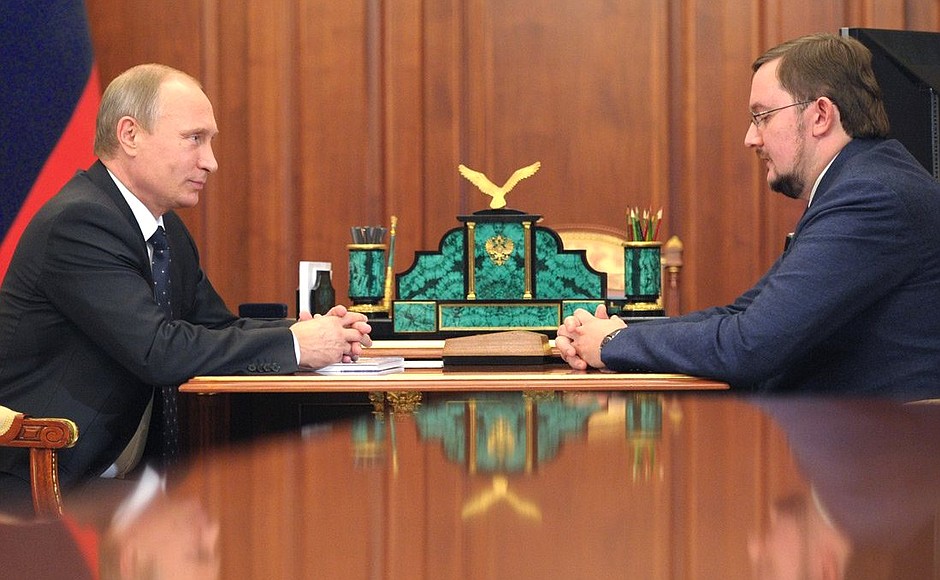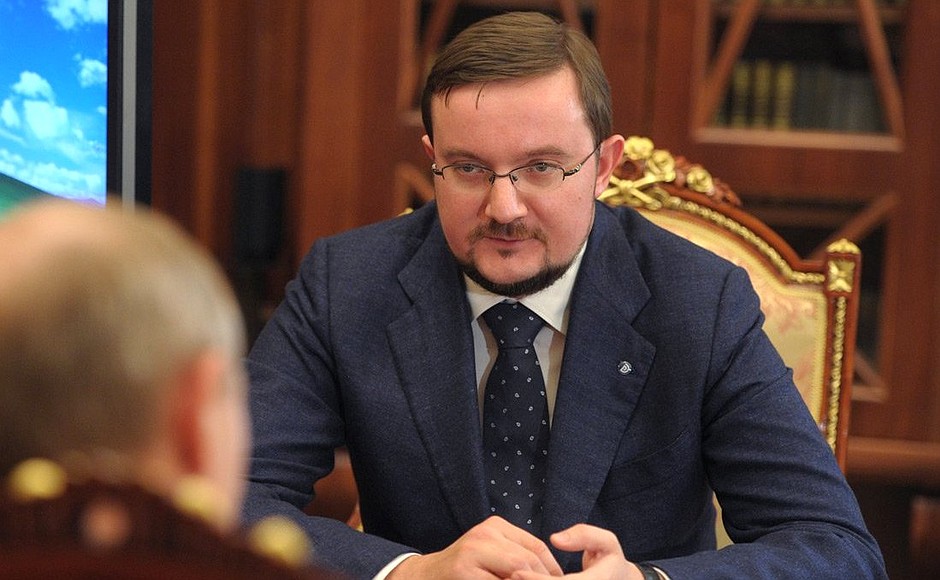Improving the business climate in Russia and the association’s programme of activities were the main subjects of discussion.
Delovaya Rossiya brings together businesspeople working in the real sector of Russia’s economy.
President of Russia Vladimir Putin: Good afternoon.
Mr Repik, I know that you were recently elected co-chairman of Delovaya Rossiya, one of the country’s most prominent business associations. Your association has always had excellent working relations with the [Presidential] Executive Office and the Government, and I hope this cooperation will continue.
I expect that active work on drafting relevant initiatives to improve the business climate and working environment, everything related to entrepreneurial initiative in short, will continue to develop and we will work together.
Co-chairman of National Public Association Delovaya Rossiya Alexei Repik: Thank you very much, Mr President. Thank you, first of all, for this chance to meet and exchange our thoughts on the subjects of greatest concern to the business community at the moment.
We see that you always discuss measures and decisions concerning business with the business associations and we feel that we are taking part in the decision-making process. You launched the National Business Initiative at an earlier Delovaya Rossiya congress, and this proved a very effective step as it enabled us to get directly involved in carrying out the measures that were included in the roadmap for improving the investment climate.
We held a congress on September 29 and discussed the complicated situation we face today. Of course, when we face completely unfounded widespread discrimination in terms of access to capital and when our partners tell us to our faces what they have to do (for example, wind up projects that are of interest and benefit to them), it does create some worries, all the more so when the atmosphere is getting tenser all the time and we keep hearing that things will get even worse and that everything we undertake is doomed to fail.
But businesspeople are not the sort to give up at the first sign of alarm. On the contrary, we see the current challenges as opportunities and this is why we proposed at our recent congress the initiative to create a thousand privately-owned non-raw-materials-related production facilities — the Delovaya Rossiya Plants programme. We presented this project to you when we met in Voronezh. We have just over 100 facilities so far, but we see immense potential in Russia’s domestic market, which is the 6th-biggest in the world in terms of size and attractiveness. Our business colleagues from other countries recognise this too and despite the current situation continue to show active interest in opportunities for investing in Russia’s economy.
But to actually carry out these programmes there are a number of needed measures that we think will help to speed up the process. This includes settling issues concerning accessible financing for the new plants’ construction. We are not asking for money from the National Welfare Fund and are not waiting for a hail of gold to come tumbling our way. We think that we simply need to make use of the resources that our economy already has at its disposal.
First of all, we can mobilise domestic capital and draw funds from Russian investors and those collecting natural resource rents. Rather than investing these funds in US bonds with a yield of near zero or depositing them at zero-interest in foreign banks (from which you cannot always withdraw them again later), I think we could offer Russian investors a good programme with solid investment opportunities in terms of profit and safety for their capital. Here, of course, we need to try to encourage these companies’ economic effectiveness.
The success of any business depends first of all on the product, then on the team, and in third place, probably, on having sufficient resources and financing. Coming back to the financial aspect, in May, I think it was, you gave the instruction to encourage the development of new production facilities not related to the raw materials sectors. We are monitoring the progress here. So far, unfortunately, we have not seen steps in this direction. We are waiting. But if the mechanisms already created for priority development areas and special economic zones were extended to cover competitive new business in the non-raw-materials sector, this would make investing in these new Russian non-raw-materials production facilities a lot more attractive.
Vladimir Putin: Analyse all of these instruments you just mentioned and send us a summary. Some of what you suggest is possible, some of it not, but we need first to make a critical analysis and draft concrete proposals. Is that all right?
Alexei Repik: Yes, we will do this.
I think that aside from the instruments I just mentioned, there are plenty of other resources too that could be put to use.
We want to modernise production, for example, and raise labour productivity. I think it was 12 or 13 years ago now that the Government approved its famous resolution No. 1 on depreciation of various kinds of fixed capital. We would not need to come up with any legislative novelties, but could simply reduce or transfer capital goods in the rapid amortisation category and thus encourage investment in new production lines and machine tools. I think these classifications were last reviewed nearly five years ago.
Another important means of encouraging industry in Russia would be to look at what is happening with industrial policy now. Delovaya Rossiya has been trying for nearly a decade to push through a law on industrial policy, and it is finally coming before the Duma. It contains a very important provision on not allowing any worsening in conditions for investors who finance the construction of new non-raw-materials production facilities. If this provision stays in place and the law is passed, we will breathe a sigh of relief.
As I said, along with financing and business competitiveness, the economy depends hugely on products, technology and skills. Russia has enormous potential for technology growth. We have fundamental science of which we can be proud. We have always taken pride in our science and with good reason. But we sometimes have problems with translating the theories into practical application.
I think that here, we could use the same principles that we adopted for the roadmap used by the National Business Initiative. In other words, we could carry out a business technology initiative that would get business involved in defining the new sectors and technologies in which society and the economy would invest.
At the same time, we cannot forget foreign skills, especially ones of critical importance. But I would probably take a fresh look at the situation right now, because with the current turbulence and, to be frank, our drop in confidence in our traditional partners, business cannot just sit back and watch on as long-term joint plans are wound up for reasons we do not understand.
I think that investment in technology should come primarily through strategic partnerships and joint ventures so that the know-how and technology stay here in Russia. Of course, it is a positive thing when a big foreign company builds a plant here, creates new jobs and pays taxes. But tomorrow they might be pressured or persuaded into locking everything up and leaving, and then we do not gain any new knowledge.
At Delovaya Rossiya, we propose a format for work that essentially creates a kind of ‘marriage agency’ for international and Russian business. Under this system, we look for Russian partners and together with the ASI (Agency for Strategic Initiatives), and EXIAR (Russian Agency for Export Credit and Investment Insurance) and the Russian Federation trade offices abroad will create new ‘business families’. We will try to do this in such a way that even if one of the ‘parents’ wants to or is forced to leave, the ‘children’, that is, the technology, know-how and so on, remain in Russia, so that we do not end up with knowledge and technology gaps in areas of critical importance to us.
Probably my last important point is that all of this is possible only when you have a high-quality, good, strong team. In other words, people are important, and Russia is rich in people. Delovaya Rossiya is an association of private businesses working outside the raw materials sector. We know our employees personally and are like a family in a way (the whole time that I was general director of my company I knew the face of every employee), we have nearly 2,000 employees, but we made it a basic and important principle to know them personally, because we are doing business and we are doing it together.
We will therefore work actively on helping to organise professional communities and get them involved in developing the standards that will make it possible for new companies to get qualified and competitive personnel, fast, immediately, on time, so that no one has to wait so long. But this will probably only work if we have young, energetic and involved leaders at the forefront, people who can push ahead with the complex and interesting processes involved in creating new businesses.
It is therefore crucial for us that you support the steps society and business are taking in each other’s direction and that you give the signal to our colleagues and to the public that honest businesspeople are a good thing and really are the supporting pillar of our economy.
We long ago came up with an initiative that Mr Titov [Presidential Commissioner for Entrepreneurs’ Rights and head of Delovaya Rossiya until 2012] told you about. This was the idea to hold Year of the Entrepreneur. I think that now would be a good time for this because Russian business has a future ahead of it, a bright future too, we think, and we simply want to get more people involved in our work. This is our mission.
To move further in this direction, we launched together with the Russian Historical Society a very interesting project – The History of Russian Business. It is based on concrete examples from the past, examples of people who built their businesses from scratch, made the Russian economy competitive in the past and continue to do so today. The aim is to replicate these examples and get many more people following in their footsteps.
Vladimir Putin: You have a busy work programme. I wish you success in your new post. I am sure we will work together. Your ideas really are interesting and offer good prospects. They are good ideas and we will carry them out together.
Alexei Repik: Thank you very much.
<…>

